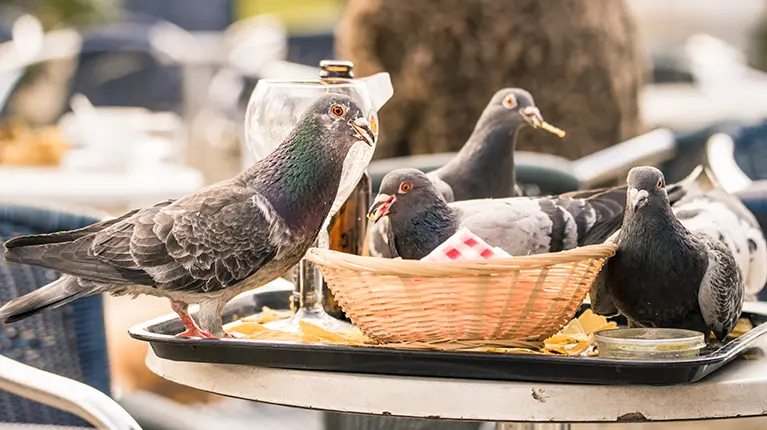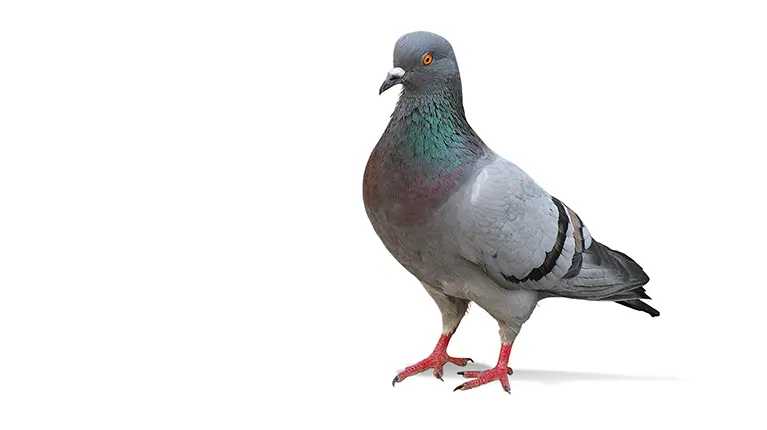Disinfestation of domestic pigeons and other birds

In recent decades, domestic pigeons have become an urban plague that needs to be stopped. Truly Nolen has extensive experience in controlling the numbers of these birds, preventing them from transmitting diseases and destroying property.
Domestic pigeon disinfestation? It's time to call Truly Nolen!
Pigeons are one of those animals that arouse both passion and hatred. Many admire their usefulness as carrier pigeons, their intelligence and sense of mission, their resilience, their closeness to people, and the symbolism of the bird itself.
The pigeons that inhabit the cities, a frequent presence in gardens, on the edges of roofs, and perched on wires, descend from the wild pigeons that were domesticated by man to deliver messages.
Why shouldn't we feed pigeons?
Many people feed pigeons by dropping food on the ground.
This species eats the grain it easily finds in agricultural facilities, food factories, restaurants, gardens and recreational areas, and food loading and unloading areas. They are bold and sometimes aggressive, attacking and entering facilities to obtain food.
Pigeons can multiply rapidly as their breeding season occurs several times a year. They usually lay two eggs at a time, which hatch after an average of 18 days.
What are the dangers provoked by pigeons?
Despite their long history with humanity, pigeons are considered an urban pest.
Pigeons can transmit diseases such as cryptococcosis, salmonellosis, histoplasmosis, and viral encephalitis. They carry fleas, mites and can also infect domestic animals.
Other city birds that can be considered pests include sparrows, gulls, and swallows. However, the pigeon causes more damage and is the main target of bird disinfestation measures.
In addition, the droppings they throw on buildings, roofs, balconies, statues, cars, electrical appliances, and sidewalks (and occasionally on people passing on the street) cause serious damage to properties.
The transmission of disease occurs by different means. For example, inhalation of materials that have been in contact with excrement, transfer through parasites or through contact with contaminated water or food.
If you suspect contamination, be aware of the following symptoms and contact a doctor immediately:
- Fever
- Weakness or fatigue
- Chest pain
- Nausea and vomiting
- Night sweats
- Mental confusion

What species of domestic pigeons are there in Portugal?
There are three main species of pigeons found in Portugal. Sometimes, some species, such as the wild pigeon and the wood pigeon, are associated with flocks.
- The wood pigeon (Columba palumbus) is the most frequent and largest. It is characterized by its gray color and white spots on the wings and neck.
- The wild pigeon (Columba oenas), in various shades of gray, is also known as seixas. It breeds mainly in winter in coastal areas. It nests in the northeast of Portugal.
- The Rock Dove (Columba livia) is a wild species. It has a gray plumage and a white back wing, with two black stripes clearly visible. It lives in coastal and inland rocky areas.
Pigeon Disinfestation
To prevent a pigeon infestation, we must limit their access to water, food and shelter.
With Truly Nolen, pigeon disinfestation is done by placing nets and spikes that ensure the birds are kept away.
- Birds of prey
- Anti-bird spikes
- Tension cables
- Electric repellents
- Bird nets
- Lasers
Want to call a pigeon disinfestation expert? Truly Nolen can help!
Learn more about all of our disinfestation services.